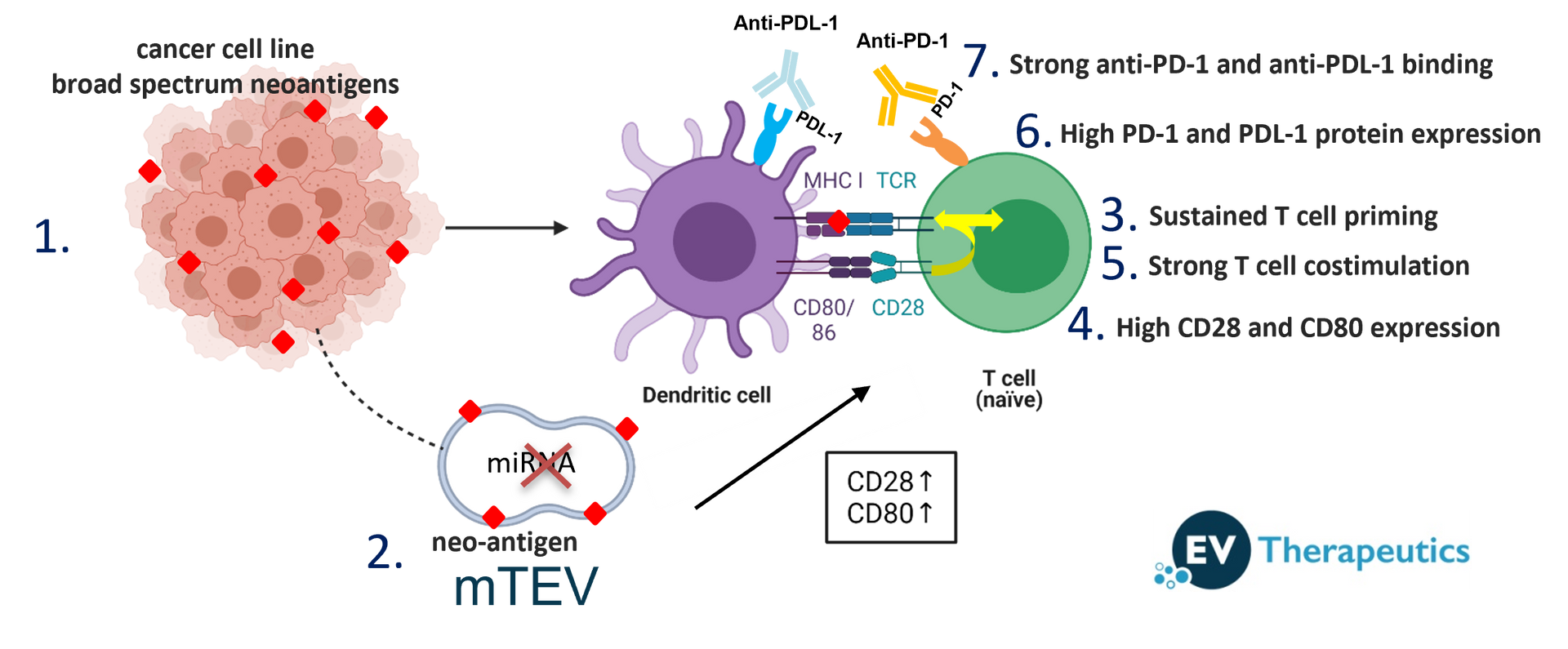Our Platform: A novel neoantigen-based therapeutic cancer vaccine
mTEV is a first-in-class immunotherapy platform, which is designed to block the principal immunosuppressant microRNA (i.e. the key inhibitor) that prevents the natural expression of both CD28 / CD80 costimulatory proteins on the surfaces of T cells and antigen presenting cells (APC), respectively.
By delivering a broad pool of immunogenic tumor-cell derived neoantigens via nano-particle-sized extracellular vesicles, mTEVs effectively resuscitates healthy immune cell function allowing these cells to release cytokines (i.e. interleukin-2), permitting T cell differentiation, expansion, and migration into the tumor micorenvironment and transform into competent effector T cells (i.e. cytotoxic T cells) that kill cancer cells.
Once the T cell are reactivated by the mTEVs, they will naturally attempt to control the strong stimulation by putting on the "breaks" via the expression of immunosuppressant Programmed Cell Death Protein-1 (PD-1) on the cell's surface (i.e. the checkpoint protein). Upon the activation of the T cells checkpoint, sequential administering of an anti-PD1 antibody (i.e. checkpoint inhibitor), blocks the engagement with its corresponding ligand, PDL-1, on the antigen presenting cells (APC) allowing for sustained activation and long term therapeutic benefit.
Below are some of the ways mTEVs can be deployed as a therapeutic:
- In late stage cancers, mTEVs in combination with checkpoint inhibitors functions as a therapeutic cancer vaccine by helping restore the T cell anti-tumor immune response through the delivery of a broad spectrum of immunogenic neoantigens (RNA, DNA and peptides).
- In early stages of cancers, mTEV can function as a prophylactic cancer vaccine by stimulating long-term memory cells by activating acquired immunity. Thus, mTEVs act as effective immune prevention in minimal residual disease (MRD) patients.
The Problem: TEV carry immune suppressive factors that down-regulate CD28/ CD80 expression rendering checkpoint inhibitor ineffective
Summary:
1. As tumor transforms from early- to late-stage cancer, hypoxia (i.e. a low oxygen condition) within the tumor microenvironment (TME) drives up the production and release of TEV (tumor-derived extracellular vesicles) into the extracellular space. These TEVs contain few immune stimulating neo-antigens. In the most prevalent cancer patient population (MSS sub-type, 85%) a low number of surface antigens are expressed.
2. TEVs carry many immune suppressive miRNAs (a non-coding RNA), which are taken up by both dendritic cells (a major antigen presenting cell) and T cells.
3. A low number of expressed surface antigens suppresses T-cell priming, which is the initial trigger of internal cell signaling.
4. The immunosuppressive miRNAs in TEVs decrease the expression of key immune costimulatory proteins CD28 and CD80 in both T-cell and dendritic cells, respectively. This causes a weak/no costimulation, which is the essential secondary signaling trigger.
5. The combined poor T cell priming and weak T cell costimulation (i.e. T cell activation) blocks PD1 and PDL-1 expression on T cell and dendritic cells, respectively. Checkpoint inhibitor antibodies administered to cancer patient cannot bind to PD1 or PDL-1 receptors, thus prevent a sustained T cell response and prevent their therapeutic benefit.
The Solution: mTEV are modified TEVs devoid of the fundamental immunosuppresents (i.e. miRNA) and carry a diverse payload of immune stimulating neoantigens to up-regulate the costimulatory CD28/CD80 proteins that allow checkpoint inhibitor efficacy.

Summary:
1. mTEV are derived from cGMP cancer cell line(s).
2. mTEVs are prepared by harvesting TEV and depleting them of immunosuppressant (miRNA-) while immune stimulating neoantigens (Ag+) are kept.
3. Upon internalization of the mTEV into the dendritic cells the neo-antigens are prepared for presentation via the MHC I complex onto the surface, which then binds to the corresponding T-cell Receptor (TCR). This triggers the initial T cell signaling also known as priming.
4. Systemic administration of mTEV restores the expression of CD28 and CD80 on T-cells and dendritic cell surfaces, respectively.
5. High affinity binding of CD28 with CD80 (or CD86 with lower affinity) is required for a strong T-cell costimulation. This triggers the secondary T cell signaling within the cell.
6. A primed and costimulated T-cell allows for high expression of key checkpoint inhibitor proteins (i.e. PD1 and PDL-1) on their corresponding cell surfaces.
7. The sequential administration of checkpoint inhibitor antibody allows a sustained anti-tumor immune response and inhibition of PD-1 and PDL-1 pathways.
Learn the history of immunotherapy by James Alisson at the 2017 PMWC conference in Silicon Valley. Note in James's talks how checkpoint inhibitors work only on colorectal cancers with microsatellite (MSI) high subtype patients. Most colorectal cancer patients (>85%) are MSS sybtype or "cold" tumor types and do not currently respond or qualify for to checkpoint inhibitor therapy.
View the following YouTube tutorial from Dr. Kristeen Barker to learn more about Checkpoint Inhibitors & Co-stimulatory Molecules in Immunology.


